2023.03.15.
【Inquiry Classes】Learning to develop global citizenship cultivated as an SGH and WWLC projects
Global Study Basic Course(1st grade)
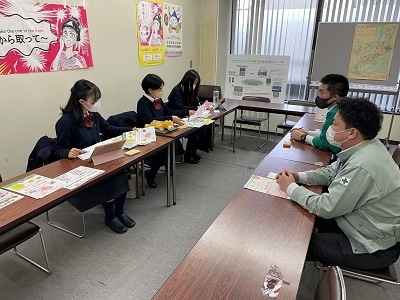
Phase 1
Students will deepen their understanding of the concept of the SDGs and the 17 goals. As they look at SDG issues that are occurring in society around them and find solutions to them, they will understand the importance of thinking about the SDGs in relation to their own lives.
Phase 2
Through field studies, we will gather first-hand accounts of organizations and people who are working on various SDG initiatives in their local communities. By working together in groups to visit these sites, students will experience creating points of contact with society.
Phase 3
In the process of compiling the "learning to know society and to know oneself in society" experienced in the field study into a presentation, participants will develop their ideas about the direction in which they, as members of society, should take action in society in the future.

3 Elective Courses (2nd grade and 3rd grade)
・Acquire the skills to utilize AI to build peace (AI)
This class is designed for students to learn about AI, which will become increasingly important in the coming society, and to learn technologies to solve various problems by utilizing AI. Through visits to companies that are using AI, students will learn techniques for utilizing AI.

・Learning in the field and developing a sense of ownership of social issues (Peace Study)
Through learning about society outside the classroom, we will tackle the major themes of "peace" and "human rights". 2nd year students will study "how to realize peace" with the keywords of "Nagasaki, Okinawa, and Auschwitz". We will visit Nagasaki and our nearby "Okinawa and Auschwitz". They will also learn how to give presentations, write essays, and "how to see things".
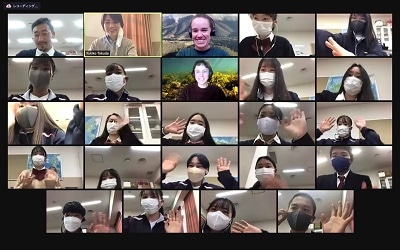
・Connecting with High School Students from Other Countries to Solve International Issues (Global Study)
This is a PBL-type class that uses online discussions to work together with high school students from other countries to solve familiar social problems. Students learn to collaborate and explore across diverse values and deepen their practical skills as they sense problems, analyze and discuss them, and plan and implement solutions.
Various Events of Inquiry Classes
International Online Meeting
The Executive Committee, consisting of volunteer students from our school and partner schools, organized and conducted three online international meetings with high school students from Indonesia, the Philippines, India, Egypt, and other countries. 300 high school students participated in the events. In the final session, the participants shared what they can do to realize the SDGs through the results of their exploratory learning. More than the presentations and discussions in English, the experience of being involved in setting the theme, planning and publicizing the program, and actually facilitating it, greatly developed the executive committee members.
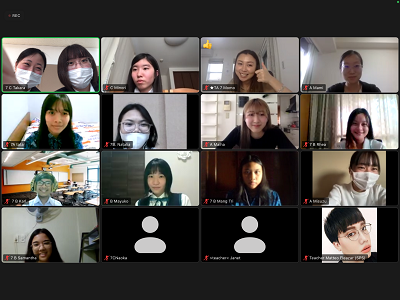
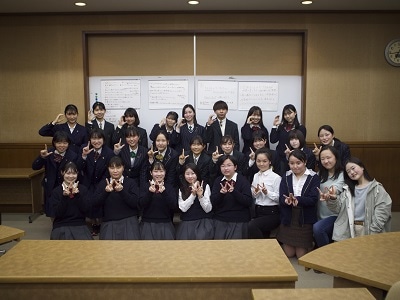
WWL Student Exchange Meeting(生徒交流会)
The purpose of this program is to think together with high school students from many other schools about what they can do in the future as the main actors in solving the SDGs, and to learn from each other. An executive committee was formed, consisting of students from our school, which is the base school, and students from partner schools, who not only prepared for the event by selecting lecturers, negotiating and planning the details of the project, and creating flyers for publicity, but also managed the event on the day of the event, taking responsibility for its progress as their own event, rather than passively participating in the event. The students did not passively participate in the event, but took responsibility for its operation as their own event.

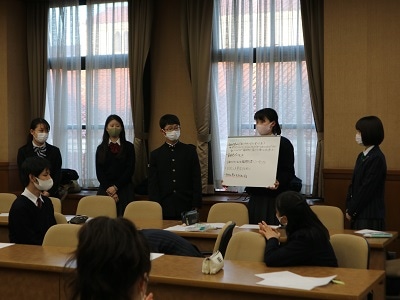
Cross-Curriculum Meeting(2nd year students)
This is an opportunity for students to collaborate in a cross-curricular manner through their presentations in the required elective courses for second-year students. The name "Cross-Curriculum Meeting" was chosen to reflect the image of students freely and openly sharing their learning across subject areas, and to motivate them to explore further. The Cross-Curriculum Meeting, also known as the Cross-Curriculum Debriefing, uses Zoom to allow representative students from each classroom to present what they have learned. Students listening to the presentations were given a feedback sheet to evaluate each other's work in order to improve their presentation skills in the future.
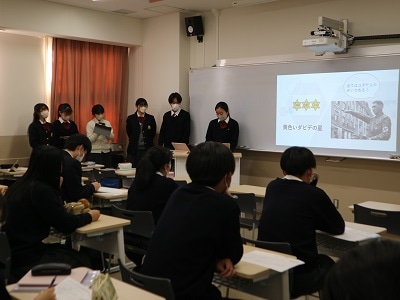
Inquiry x Reading
Reading class to deepen students' interests
The "reading class" has continued at our school for over 40 years. Our greatest wish is that students will graduate from high school and go on to college and graduate from high school and go on to college. In the third year, students compile and present a thesis as the culmination of their studies. The students are encouraged to further explore new "questions" generated in the process of writing their thesis, which will lead to the selection of a university department and the ability to open up a new chapter in their lives.

Inquiry x Science
Discover the "fun" in biology
Why do we do research in the natural sciences? While "to help people and society" is an admirable motive, I believe that at the root of it all, it is because it is "interesting. There are about 2 million known species of organisms that have evolved over the course of 3.8 billion years of history, and they are far more diverse and sophisticated than we can imagine. In this class, students will first learn about the "fun" of living things, then explore the species and phenomena that interest them with "fun" as the driving force, and cultivate the ability to accurately communicate this through presentations and other means.

Inquiry x Japanese History
1) Echoes of "present" and "past
History is an endless dialogue between the present and the past. (E.H. Carr) The goal of this course is to develop the ability to question the present using the past as a clue, and to acquire "critical thinking" skills that are not bound by common sense, preconceived notions, or popular trends.
2) Local" and "Global"
The course emphasizes both a local perspective, which looks at history from the perspective of a familiar region, and a global perspective, which looks at history in relation to a wide variety of regions.


